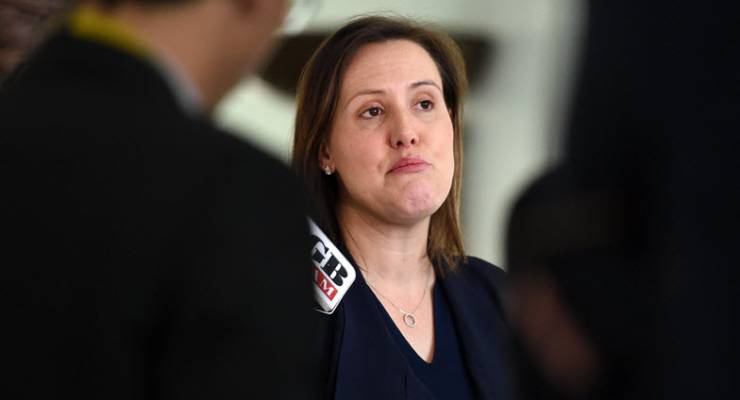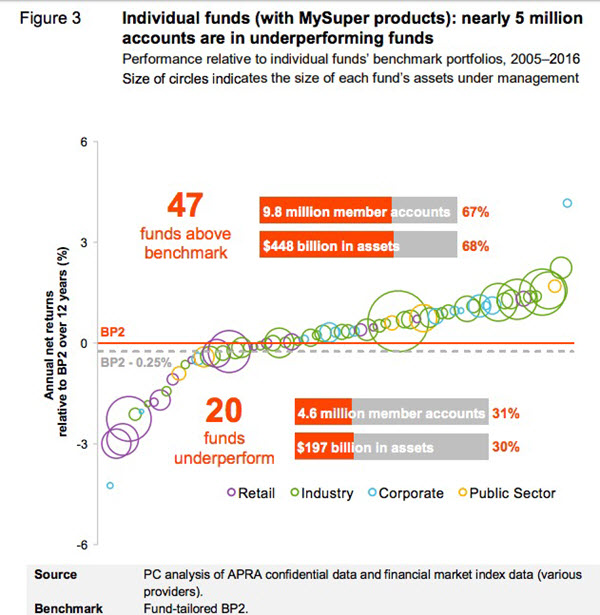
Make no mistake: the Productivity Commission’s draft report on default super funding arrangements is a ferocious blow for the government and the retail super sector. Not even Kelly O’Dwyer’s pre-emptive — and pathetic — attacks on industry funds run verbatim by the Financial Review can distract from it.
The default superannuation issue is complex and has a long history, but it boils down to this: the award system long restricted the capacity of retail superannuation funds to get access to new workers because the awards dictating where employers put new employees’ super was dominated by industry funds (and AMP). Labor tried to fix the process via a Fair Work Commission panel but got too cute by half and the panel was knocked off when the retail super funds’ lobbying arm, the Financial Services Council, defeated it in court. As it turned out, that was a textbook Pyrrhic victory, because it froze the current settings until the government found a way to open up default funds to the big banks. That was four years ago. The FSC has been screaming for the government to do something ever since.
Having repeatedly been defeated in its efforts to hurt the industry super sector, the government referred the whole matter to the Productivity Commission in 2016. Today’s draft report is the second-last stage in that process, and the PC’s solutions, and the report itself, will infuriate the retail sector and the government, because it is effectively a ringing endorsement of industry funds.
On the central issue, the default super mechanism, the PC rejected the open-slather model favoured by the retail sector. The FSC and the big banks wanted any MySuper-complying fund to be eligible for default status, meaning workers (and employers) would face a mobile phone plan-like array of impossible-to-compare options and banks could “encourage” employers to adopt their funds as part of a package of financial services — i.e. “make our fund your default or you might find it difficult to get another loan”. Instead, the PC’s draft recommendation is that employers be assisted with choice by an independent national panel that would select the best 10 funds available. Employees could be defaulted into one of those, or employers could pick another, or employees could pick another, but the 10 “best in show” funds would likely get most business.
Which funds would be in the top ten? The PC doesn’t do a trial selection, but its lengthy section on fund performance will make Kelly O’Dwyer and the big banks wince. In unequivocal terms, the completely independent PC declares not-for-profit funds significantly out-performed retail funds, 6.8% to 4.9% between 2005-16. A rough guide to who would be in the top 10 — the right end of this diagram — shows it would be dominated by industry funds, with maybe one retail fund in there. There are some industry funds in the low-performing end, as well, but that’s dominated by retail funds.

What’s also plain from the PC’s analysis of performance — which it says has been made difficult by the lack of data and co-operation from industry — is that, while there are some big retail funds at the bottom of the list, smaller funds are generally outperformed by bigger funds (the PC also says only large self-managed super funds perform comparably with industry funds). Forcing smaller funds into mergers with larger funds to get rid of the underperformers is one thing that brings everyone — retail, industry, government — into agreement, although you won’t ever get industry super fund bodies to openly say it. The government’s budget measures to get the ATO to seize small, inactive super accounts will hurt small funds, and its moves to limit insurance for young workers will also disproportionately punish lazy small funds that are gouging on unnecessary insurance premiums.
The PC also wants more independent directors on boards so — inter alia — mergers aren’t rejected by lazy directors who would lost their seats. This is the one area where the government has had anything like a win — though it recently abandoned yet another effort to impose more independent directors on industry super funds.
The PC’s vision for super is one where the high-fee, low-performance funds will struggle to attract new members, small funds will be consolidated into a more concentrated but competitive market, strong performers will have an institutional advantage, new entrants into the workforce can be confident they’ll have one super fund for their career, that they control, and where the system is designed to champion the interests of workers. It’s a million miles from the world the big banks and the government sought where they could gouge customers with low-performance retail funds that delivered for shareholders, not for workers.








My old Gran always said it required grace to be embarrassed.
“… but its lengthy section on fund performance will make Kelly O’Dwyer and the big banks wince.” I think you are too generous Bernard. O’Dwyer and the banks have rhinoceros strength hides and would never wince because that would suggest weakness.
It will be a challenge but the Liberals will find a way to favour the retail super funds even after this report. Maybe they just ignore it.
Funny how, even after spending 5 years stacking organisations like FWA & the PC, the Libs still cannot get outcomes that are 100% in line with their ideological positions.
As long as Turnbull stacks his ministry with no talents who just happen to be his supporter base then this government will stumble from one disaster after another till its put out of its misery by the voters and put down, never in Australia`s history has a government, or governments if you include Abbott`s disaster, been as politically inept and corrupt as these collection of ideological and economic incompetents, that there still are a section of the public too blind or stupid to see what their votes are doing to this country, and still willing support this clowns is hard to understand.
Again and again we hear that the Govt is not capable of running businesses – but why is every outcome of privatisation a cost to the community? Privitise and then get reelected by presenting policy to correct things to the way they were before- or jump off and get a job with the category. Im about done with the short sighted policies that do nothing but short term revenue and long term pain for the country – just so you can blame the pervious incumbent for policy failings – please dont call me a cynic but just out of chance are you two parties working together??? It can be the only way you would be so inept,,, surely ! NO wonder Pauline gets a run – what are the options…!
Ashamed and preparing to leave for a more progressive country . — Lao
See ya — idiots!
Dave Mack